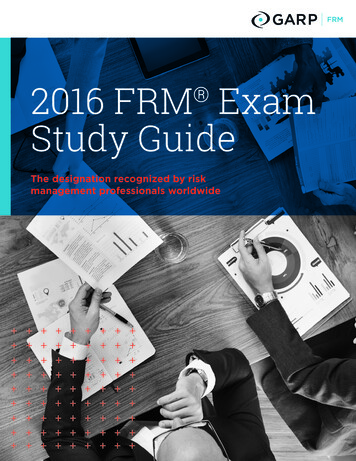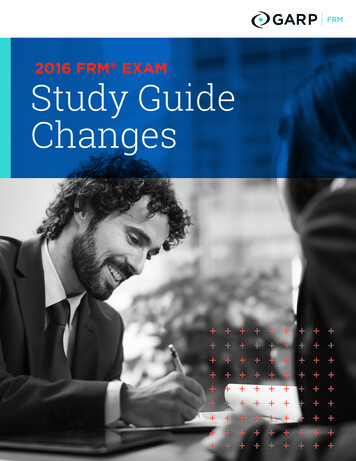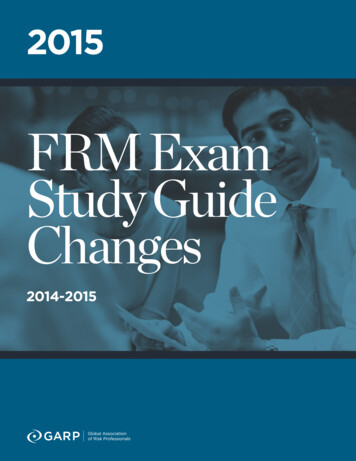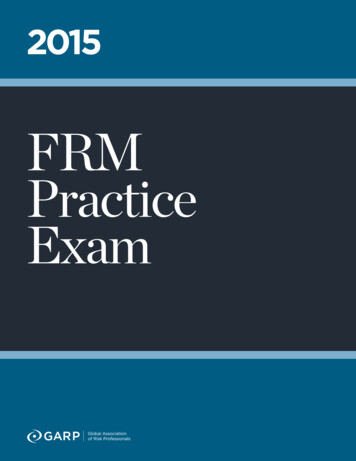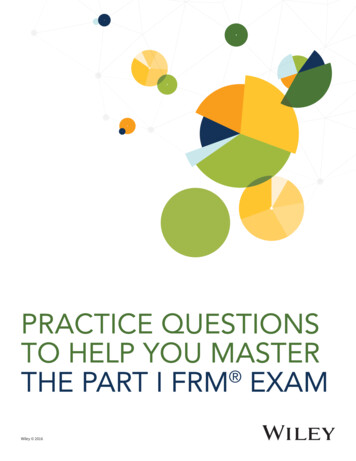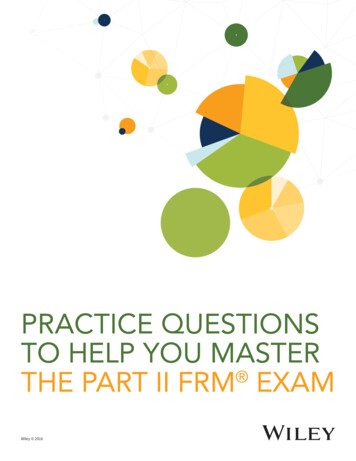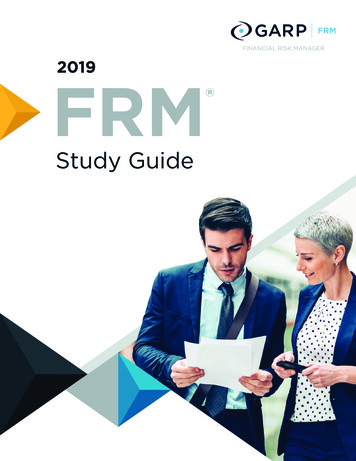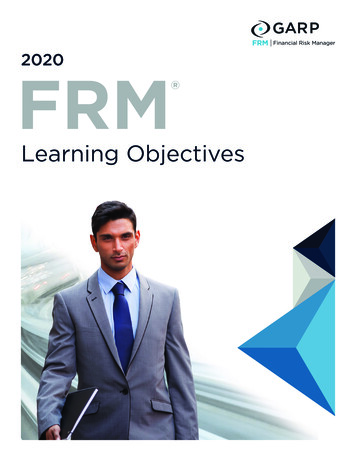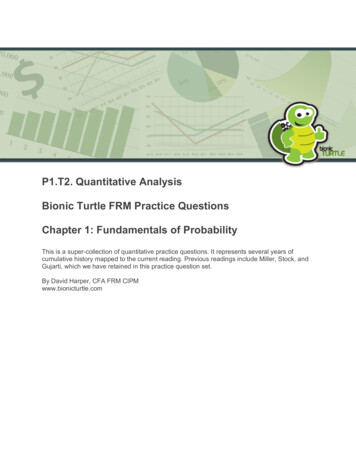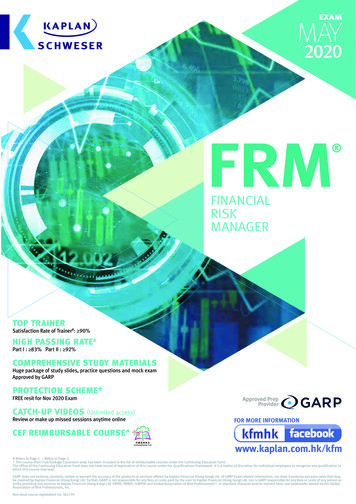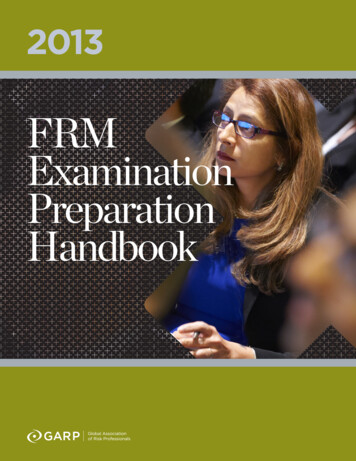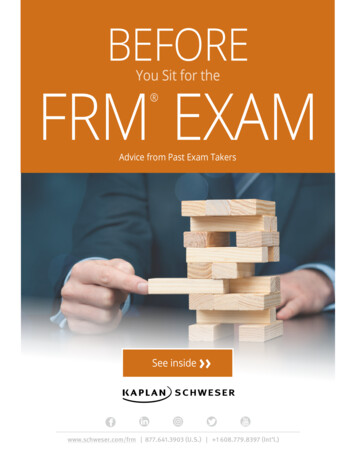
Transcription
BEFOREYou Sit for theFRM EXAM Advice from Past Exam TakersSee inside www.schweser.com/frm 877.641.3903 (U.S.) 1 608.779.8397 (Int’l.)
WELCOMESo, you’re consideringthe FRM Program now what?As the financial industry becomes increasingly competitive and concerned about managing risk,it is important to distinguish yourself. The FRM certification can set you apart in the globalmarketplace and help you advance your career. You probably have a lot of questions about theFRM exams, the process of achieving the certification, and your career options in general. We haveenlisted the help of many FRM designation holders who have successfully gone through theprocess and asked them for advice on what it takes to become a certified Financial Risk Manager.We brought all of their advice together in this eBook to help you decide if the FRM designation isright for you.This eBook is broken up into three sections: 1) advice on passing the FRM exams; 2) important skillsneeded for future FRM professionals; 3) what FRM professionals wish they’d known before they satfor the FRM exam.We hope you find this resource helpful, and we wish you the best of luck as you begin your FRMjourney.Best,The Kaplan Schweser Team Previous2Next
ABOUT THE FRM EXAMThe FRM exam is split into two parts and offered twicein Part I: market, credit, operational and integrated riska year in May and November. Parts I and II of the FRMmanagement, investment management, and currentexam differ in structure, so it is important to prepare forfinancial market issues.different testing approaches. Part I is 100 multiple choicePart I is always offered in the morning and Part II in thequestions focused on tools used to assess financial riskafternoon. You can take Part I and Part II on the samelike fundamental risk management concepts, quantitativeday, but the Part II exam will not even be scored by GARPanalysis, financial markets and products, and valuationunless you first pass Part I.and risk models. Part II contains 80 multiple choicequestions measuring your ability to apply the tools Previous3Next
SECTION I: ADVICE ON PASSING THE FRM EXAMSGet a study plan and adhere to it“There is no magic formula but hard work.”– David Rowen, CFA, FRMThe FRM exam is the most globally recognized andEnsure you understand the curriculum and the entirerespected certification for financial risk management. Bestudy guide you will be studying. You will want to prepareaware that the curriculum takes a lot of time to master,for every section on the exam. Using an exam prepand the exams are not to be taken lightly.provider like Schweser will help you develop a study planand identify and master key areas of the curriculum.Setting a study plan will help keep you fromEven if you decide to study from the core curriculum, youprocrastinating. These exams cover too much material formay want to consider purchasing notes and a questioncramming to be a successful study strategy. Dedicatingbank (Qbank) from an exam prep provider. Qbanks breaka certain amount of time to your studies each week willdown key aspects of the curriculum in a more concisekeep you on pace and better able to absorb the material.manner and provide additional practice questions andIt is recommended you study a minimum of 250 hours forpractice exams beyond what GARP offers. Regardless ofeach exam. If you do not have a financial background, youwhat materials you buy to study though, be sure to setmay find that you need to study far more than 250 hoursa plan for when and what you will study each week andfor each exam to pass.adhere to it! As one FRM professional said, “Consider FRMpreparation a part of your life.” Previous4Next
SECTION I: ADVICE ON PASSING THE FRM EXAMS CONTINUED.Practice, practice, practice!“Completing practice exams and examtype questions is just as important asmastering the content of the exam.”– Dhimal Moodley, FRM, MIFMPractice makes perfect. Ensure you work practice examSimulating real testing conditions utilizing a mock examquestions and mock exams into your study regiment. Thisis also an effective way to prepare for the exam. Puttingwill help you get used to the types of questions that getsome pressure on yourself with the clock will help youasked on the exam and help you identify your mistakeget a feel for whether you are answering questions at anpatterns. There are many study questions available fromoptimal pace for test day.GARP, as well as from exam prep providers like Schweser.A large amount of the exam is quantitative, so it isimportant to prepare well with formulas and calculations. Previous5Next
SECTION I: ADVICE ON PASSING THE FRM EXAMS CONTINUED.Studying for the CFA exams will help with FRM too“I am a CFA charterholder, and I wish I had known it would actually have beeneasier to prepare for FRM and CFA jointly.”– Burhan Kawosa, CFA, FRMMany financial professionals spend time ponderingexams are offered in June each year, so the time gapwhether they should do the FRM Program or the CFAbetween Level II and Level III can be utilized to take FRMProgram. Why choose? More than one of the FRMPart I in November. Approximately 45% of the FRM Partprofessionals we talked to recommended doing theI exam is covered on the CFA Level I and II exams, soFRM Program in tandem with the CFA Program becauseyou would already be nearly halfway prepared for thatthere is so much overlap. This certainly will not work forexam. After taking FRM Part I, it is recommended youeveryone—it will add quite a bit of additional studyingthen study for CFA Level III. Approximately 10% of theto your load compared to doing only one program.CFA Level III syllabus is covered by FRM Part I, so youHowever, you can gain efficiencies if you can spare thewould then already have a slight head start. FRM Part IIadditional study time.has about 15% overlap with the CFA Levels I, II, and IIIprograms. It’s a lot of studying, but it could be done if youIf you do go this route, it is recommended you take CFAwanted to complete it as efficiently as possible while theLevel I and Level II before you take FRM Part I. The CFA Previousinformation is fresh in your mind.6Next
SECTION II: I MPORTANT SKILLS FOR FUTUREFRM PROFESSIONALSWe asked CFA charterholders what skills are important to the next generation of riskmanagement professionals. In the following section, we’ve detailed some of the skill sets thatwere mentioned most often.CommunicationNot only is it important for risk managementprofessionals to be able to understand complex modelsand quantitative data, but they must also be able tobreak down the concepts and explain them to others. Infact, GARP’s Job Task Analysis, which surveys over 1,400risk managers about their day-to-day tasks, revealedthat communication of risk to stakeholders is the singlemost important task for risk practitioners. Quantitativeskills are not enough in the risk profession—riskmanagers must be able to translate risk findings tonon-technical managers who can then incorporate theinformation into strategic discussions.RegulationAs the financial industry becomes increasinglysentiment continues to be less tolerant of inappropriatescrutinized by regulators, risk management professionalsbusiness practices or the appearance of preventablewill be in greater demand than ever to provide modelserrors after the global financial crisis. It will be morefor how regulations can impact business. Regulationsimportant than ever for the next generation of risklike the Basel Accords and the Dodd-Frank Act encouragemanagement professionals to not only stay abreast onrisk management professionals to constantly adapt theirregulation changes, but also be able to anticipate andpractices; and these kinds of regulations will continueprepare for future changes before they happen.to broaden and deepen as public and government Previous7Next
SECTION II: IMPORTANT SKILLS FOR FUTURE FRM PROFESSIONALS CONTINUED.Modeling and Strategic ThinkingThe best risk management teams are able to keep upfactors that were relevant in the latest crisis, but be ablewith the constantly changing financial markets andto set up scenarios on each and every risk factor basedbe able to assess how different market segments canon current portfolios, even if those scenarios seemimpact one another. One FRM professional said, “Riskunlikely.” This kind of modeling and strategic thinking willmanagement professionals must be able to use all theonly get more complicated with increased regulation andknowledge they have and focus not only on those riskchanging global markets.IT and Financial TechnologyCoding and IT skills will become increasingly importantCyberattacks are a huge concern in the banking industryin the future risk management industry. High frequencybecause they could not only harm the banks’ operations,trading utilizes algorithms for investment and tradingbut also leak customer information. Cybersecurity isactivities for buy-side firms, short-term traders andexpected to increase in importance in the future, whichsell-side participants, and systematic traders. To be ablemeans more resources will be dedicated to it. There willto calculate risk, it is important that FRM professionalsbe a need for new capabilities and processes to manageunderstand how the algorithms work and know howand track these kinds of emerging risks.changes in conditions, operations, and the environmentwill impact outcomes. Previous8Next
SECTION III: W HAT FRM PROFESSIONALS WISH THEY’DKNOWN BEFORE THEY SAT FOR THE FRM EXAMThe prestige that comes with the FRM designation“The FRM is the highestprofessional standard forrisk managers.”– Fabio Polpettini, FRMDepending on your career aspirations, the FRM designation can help you get whereyou want to go. Since the FRM Program began in 1997, it has grown in popularitywith enrollments increasing every year, particularly following the global financialcrisis of 2007–2009. Financial manager positions, including financial risk managerpositions, are expected to grow at a rate of 7% over the next decade.The need for financial risk management professionals continues to grow, and theFRM designation is considered the “gold standard” of the industry. Many of thetop financial firms employ risk management professionals, including ICBC, Bankof China, HSBC, Citigroup, and Deutsche Bank. The FRM designation will help youdifferentiate yourself in financial services and expand your career opportunities. Previous9Next
SECTION III: W HAT FRM PROFESSIONALS WISH THEY’D KNOWN CONTINUED.It will change how you approach problemsRisk management is a different way of approaching financialdecision-making. Doing the FRM Program will help you betteridentify and allocate potential risks, mitigate risks, providerecommendations for better decisions in regard to all risks, andmake a risk management plan. It will also help you better prioritizerisks and ensure they are aggressively and cost-effectivelymanaged, as well as provide directions and recommendations”The most valuable takeaway is how iton issues that are critical for success. This new mindset andaltered the way I think about situations,process of assessing risks, developing a response to risks, and acontingency plan for future risk prevention will make you an asset– Britton T. Foy, FRMto a financial services firm. Previousproblems, and risks on a regular basis.”10Next
SECTION III: W HAT FRM PROFESSIONALS WISH THEY’D KNOWN CONTINUED.I wish I had done the FRM Program sooner!“I wish someone had told me about the existence of the FRM Program andits importance in shaping the risk management industry 10 years earlier.”– Subramaniam Umasudhan FRM, CFA, FCCA, ACMAMany of our former FRM students said they wished theyOther former students said that doing the FRMhad known about the FRM Program sooner because itProgram, immediately following an MBA program or inhas helped their careers so much. The FRM Program istandem with the CFA Program, would also be beneficialnewer than and not as well-known as the CFA Program,because your brain is in better shape for it. While thisbut that is quickly changing. One former student whowill not work for everyone, if you are someone whocompleted the FRM Program just a few years ago said,can jump into the next program right away, it could be“Being a banker holding a senior management positionadvantageous.in a bank, I believe earning the FRM designation andacquiring the relevant knowledge earlier is important tobecoming a full-fledged banking professional.” Previous11Next
WHAT DO YOU THINK?After reading this eBook, we hope you feelhelping individuals earn advanced designations andmore informed on what to expect from the FRMsucceed in their careers. We strive for greatness, soProgram and the risk management profession.our customers can do the same. After all, it’s yourIf you would like additional information, wesuccess that determines ours.encourage you to check out our expansive libraryVisit our website to browse or enroll in one of ourof free resources, designed to guide you throughFRM study programs. Best of luck on your pursuit ofthe decision-making process.the FRM designation!Since 1990, Kaplan Schweser has been studentfocused, results-driven, and fully committed towww.schweser.com/frm 877.641.3903 (U.S.) 1 608.779.8397 (Int’l.)MKT-002346 Previous12Start Over
“Completing practice exams and exam-type questions is just as important as mastering the content of the exam.” – Dhimal Moodley, FRM, MIFM Previous Next 6 Studying for the CFA exams will help with FRM too Many financial professionals spend time pondering whether they should do the FRM Program or the CFA Program. Why choose? More than one of the FRM professionals we talked to .
